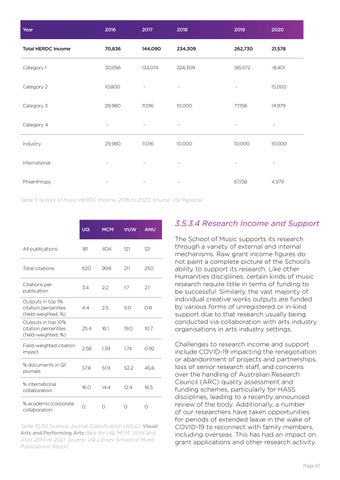Year
2016
2017
2018
2019
2020
Total HERDC Income
70,836
144,090
234,309
262,730
21,578
Category 1
30,056
133,074
224,309
185,572
-8,401
Category 2
10,800
-
-
-
15,000
Category 3
29,980
11,016
10,000
77,158
14,979
Category 4
-
-
-
-
-
Industry
29,980
11,016
10,000
10,000
10,000
International
-
-
-
-
-
Philanthropy
-
-
-
67,158
4,979
Table 11 School of Music HERDC Income, 2016 to 2020. Source: UQ Reportal.
UQ
MCM
VUW
ANU
All publications
181
404
121
121
Total citations
620
908
211
250
Citations per publication
3.4
2.2
1.7
2.1
Outputs in top 1% citation percentiles (field-weighted, %)
4.4
2.5
5.0
0.8
Outputs in top 10% citation percentiles (field-weighted, %)
25.4
16.1
19.0
10.7
Field-weighted citation impact
2.58
1.39
1.74
0.92
% documents in Q1 journals
57.8
51.9
52.2
45.6
% international collaboration
16.0
14.4
12.4
16.5
% academic-corporate collaboration
0
0
0
0
Table 10 All Science Journal Classification (ASJC) Visual Arts and Performing Arts data for UQ, MCM, VUW and ANU, 2013 to 2021. Source: UQ Library School of Music Publications Report.
3.5.3.4 Research Income and Support The School of Music supports its research through a variety of external and internal mechanisms. Raw grant income figures do not paint a complete picture of the School’s ability to support its research. Like other Humanities disciplines, certain kinds of music research require little in terms of funding to be successful. Similarly, the vast majority of individual creative works outputs are funded by various forms of unregistered or in-kind support due to that research usually being conducted via collaboration with arts industry organisations in arts industry settings. Challenges to research income and support include COVID-19 impacting the renegotiation or abandonment of projects and partnerships, loss of senior research staff, and concerns over the handling of Australian Research Council (ARC) quality assessment and funding schemes, particularly for HASS disciplines, leading to a recently announced review of the body. Additionally, a number of our researchers have taken opportunities for periods of extended leave in the wake of COVID-19 to reconnect with family members, including overseas. This has had an impact on grant applications and other research activity.
Page 61







